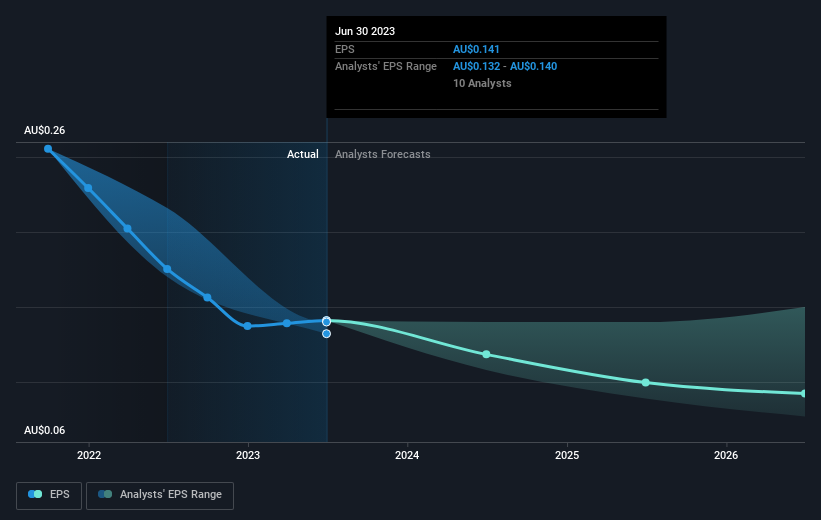- Australia
- /
- Capital Markets
- /
- ASX:PTM
The five-year shareholder returns and company earnings persist lower as Platinum Investment Management (ASX:PTM) stock falls a further 11% in past week

Generally speaking long term investing is the way to go. But along the way some stocks are going to perform badly. For example, after five long years the Platinum Investment Management Limited (ASX:PTM) share price is a whole 74% lower. We certainly feel for shareholders who bought near the top. And it's not just long term holders hurting, because the stock is down 43% in the last year. The last week also saw the share price slip down another 11%.
Since Platinum Investment Management has shed AU$82m from its value in the past 7 days, let's see if the longer term decline has been driven by the business' economics.
View our latest analysis for Platinum Investment Management
There is no denying that markets are sometimes efficient, but prices do not always reflect underlying business performance. By comparing earnings per share (EPS) and share price changes over time, we can get a feel for how investor attitudes to a company have morphed over time.
Looking back five years, both Platinum Investment Management's share price and EPS declined; the latter at a rate of 15% per year. This reduction in EPS is less than the 24% annual reduction in the share price. This implies that the market is more cautious about the business these days. The low P/E ratio of 8.38 further reflects this reticence.
The company's earnings per share (over time) is depicted in the image below (click to see the exact numbers).

It might be well worthwhile taking a look at our free report on Platinum Investment Management's earnings, revenue and cash flow.
What About Dividends?
It is important to consider the total shareholder return, as well as the share price return, for any given stock. Whereas the share price return only reflects the change in the share price, the TSR includes the value of dividends (assuming they were reinvested) and the benefit of any discounted capital raising or spin-off. Arguably, the TSR gives a more comprehensive picture of the return generated by a stock. In the case of Platinum Investment Management, it has a TSR of -64% for the last 5 years. That exceeds its share price return that we previously mentioned. The dividends paid by the company have thusly boosted the total shareholder return.
A Different Perspective
Platinum Investment Management shareholders are down 38% for the year (even including dividends), but the market itself is up 8.5%. However, keep in mind that even the best stocks will sometimes underperform the market over a twelve month period. Unfortunately, last year's performance may indicate unresolved challenges, given that it was worse than the annualised loss of 10% over the last half decade. Generally speaking long term share price weakness can be a bad sign, though contrarian investors might want to research the stock in hope of a turnaround. While it is well worth considering the different impacts that market conditions can have on the share price, there are other factors that are even more important. For instance, we've identified 2 warning signs for Platinum Investment Management that you should be aware of.
Of course Platinum Investment Management may not be the best stock to buy. So you may wish to see this free collection of growth stocks.
Please note, the market returns quoted in this article reflect the market weighted average returns of stocks that currently trade on Australian exchanges.
New: Manage All Your Stock Portfolios in One Place
We've created the ultimate portfolio companion for stock investors, and it's free.
• Connect an unlimited number of Portfolios and see your total in one currency
• Be alerted to new Warning Signs or Risks via email or mobile
• Track the Fair Value of your stocks
Have feedback on this article? Concerned about the content? Get in touch with us directly. Alternatively, email editorial-team (at) simplywallst.com.
This article by Simply Wall St is general in nature. We provide commentary based on historical data and analyst forecasts only using an unbiased methodology and our articles are not intended to be financial advice. It does not constitute a recommendation to buy or sell any stock, and does not take account of your objectives, or your financial situation. We aim to bring you long-term focused analysis driven by fundamental data. Note that our analysis may not factor in the latest price-sensitive company announcements or qualitative material. Simply Wall St has no position in any stocks mentioned.
About ASX:PTM
Flawless balance sheet and good value.


